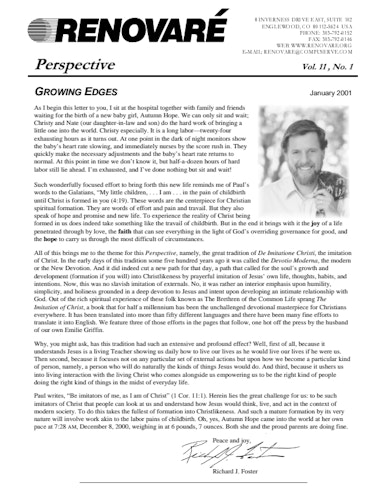“My little children…I am…in the pain of childbirth until Christ is formed in you (Galations 4:19).”
These words are the centerpiece for Christian spiritual formation. They are words of effort and pain and travail. But they also speak of hope and promise and new life. To experience the reality of Christ being formed in us does indeed take something like the travail of childbirth. But in the end it brings with it the joy of a life penetrated through by love, the faith that can see everything in the light of God’s overriding governance for good, and the hope to carry us through the most difficult of circumstances.
This brings me to the theme for this article, the great tradition of De Imitatione Christi, the imitation of Christ. In the early days of this tradition some five hundred years ago it was called the Devotio Moderna, the modern or the New Devotion. And it did indeed cut a new path for that day, a path that called for the soul’s growth and development (formation if you will) into Christlikeness by prayerful imitation of Jesus’ own life, thoughts, habits, and intentions. Now, this was no slavish imitation of externals. No, it was rather an interior emphasis upon humility, simplicity, and holiness grounded in a deep devotion to Jesus and intent upon developing an intimate relationship with God. Out of the rich spiritual experience of these folk known as The Brethren of the Common Life sprang The Imitation of Christ, a book that for half a millennium has been the unchallenged devotional masterpiece for Christians everywhere. It has been translated into more than fifty different languages and there have been many fine efforts to translate it into English.
Why, you might ask, has this tradition had such an extensive and profound effect? Well, first of all, because it understands Jesus is a living Teacher showing us daily how to live our lives as he would live our lives if he were us. Then second, because it focuses not on any particular set of external actions but upon how we become a particular kind of person, namely, a person who will do naturally the kinds of things Jesus would do. And third, because it ushers us into living interaction with the living Christ who comes alongside us empowering us to be the right kind of people doing the right kind of things in the midst of everyday life.
Paul writes, “Be imitators of me, as I am of Christ” (1 Cor. 11:1). Herein lies the great challenge for us: to be such imitators of Christ that people can look at us and understand how Jesus would think, live, and act in the context of modern society. To do this takes the fullest of formation into Christlikeness. And such a mature formation by its very nature will involve work akin to the labor pains of childbirth.
Growing Together
This is our section devoted to praxis, of which The Imitation has valuable instruction. Right at the heart of this little book is a serious grappling with the virtue of humility. This is an issue which every century of Christians have taken with utmost seriousness with the single exception of our own. Which may also help explain why The Imitation has been held in such high regard in every century but ours. Which, I would suggest, is an excellent reason for us to take another look at its teaching here. Listen to these few sample passages:
“If you want to learn something that will really help you, learn to see yourself as God sees you and not as you see yourself in the distorted mirror of your own self importance” (Book 1, Chapter 2, Creasy translation).
“But what if others discover your defects and throw them in your face? Well, that’s humility. And if you suffer that exquisite pain in silence, it’ll lead to, of all things, greater humility” (Book 2, Chapter 2, Griffin translation).
Love of self — that was the dagger that did me in. But seeking You and loving You, I found not only You, but also myself” (Book 3, Chapter 8, Griffin translation).
“Jesus: ‘Strive, my friend, to do another’s will rather than your own; always prefer to have less than more; always seek the lower place and be submissive in all things; always wish and pray that God’s will may be entirely fulfilled in you, for you see, the person who does all this enters a place of peace and rest’” (Book 3, Chapter 23, Creasy translation).
Perhaps these brief quotations are enough to help us see humility as a good thing. So then, how do we begin to grow in it? We are aware that humility is one of those things we cannot acquire by trying to acquire it! No, it comes indirectly. We receive the grace of humility by applying ourselves to other matters, matters which will place us in a more proper relationship with God, with others, and ultimately with ourselves. With regard to humility we learn:
- To contemplate God’s greatness and goodness. This will place us in a more proper relationship with God.
- To serve our family, neighbors, friends, colleagues, and even enemies. This will place us in a more proper relationship with each other.
- To understand ourselves in light of these more proper relationships to God and others.
Contemplating God’s greatness and goodness:
- Read Psalm 24 (“The earth is the Lord’s …”) and then take a walk outside. Look around you giving attention to what you see. The creation is constantly doing the will of the Father, so look and see the will of God in wind and sky, leaf and flower, and the little creatures that creep upon the earth. If you are in an urban setting, know that the power of God is over it too, even though we see it in a fallen and rebellious state.
- God’s greatness is revealed to us primarily in his goodness. With this in mind, contemplate Luke 7:36 – 50, the story of the woman who washed Jesus’ feet with her tears and dried them with her hair. Ponder Jesus’ acceptance and goodness toward her. Then, consider who in your life experience is like that woman and what attitude and actions you will want to take toward him or her.
Serving our family, neighbors, friends, colleagues, enemies:
- For seven days at the beginning of each day pray: “Lord, send me someone today I can serve”. Now, watch carefully who comes into your path in need of an act of genuine service.
- Instead of the world’s program of “random acts of kindness,” plan out specific acts of kindness to each family member, once a week for a month.
Understanding ourselves in light of a more proper relationship to God and others:
- Write out a list of the attributes of God. Study yourself — your deeds, actions, and accomplishments — in light of that list. This exercise is not meant to devastate you but to give you a more proper sense of place where you can rest easy under the rule of God. You are not the CEO of the universe, nor do you have to be.
- While you are serving others, watch yourself and see how the actions themselves begin to temper your own sense of self-importance and even your need to be recognized. Service is its own reward.
Originally published in Perspectives newsletter, January 2000.
Text First Published January 2001



